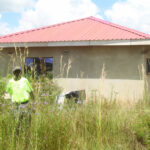Hundreds of travellers were left stranded in Beitbridge on Wednesday after a government crackdown on smuggling brought bus services to a standstill.
The operation, launched following Finance Minister Mthuli Ncube’s budget speech last Friday, targeted cross-border traders and resulted in the seizure of dozens of buses and hefty fines.
Minister Ncube, during his 2025 national budget presentation at the new Parliament Building in Mt Hampden, declared war on smuggling. He announced a new directive authorising the Zimbabwe Revenue Authority (Zimra) to seize goods if importers failed to provide proof of customs duty payment. This authority extended to raiding tuckshops and other outlets suspected of selling smuggled goods.
The announcement swiftly led to the deployment of security agents who set up roadblocks and checkpoints on major routes leading to Zimbabwe’s border posts, Beitbridge among them. Armed police officers, working alongside other security personnel, stopped vehicles originating from border towns, diverting those lacking proper documentation for imported goods to nearby customs yards.
“We were ordered to return to the border post by a team which stopped us about 30km out of Beitbridge. We were escorted to the border post, where thorough searches were conducted on buses,” a woman caught up in the operation recounted to NewsDay yesterday.
The impact on bus operations was immediate and severe. Between 120 and 220 buses traverse the Beitbridge border post daily, with many more operating within the border town itself. This number typically increases during peak seasons. On Wednesday however, the situation was drastically different.
At Dulivhadzimo bus terminus, the scene was one of chaos and inactivity.
“Our employers have told us not to load goods. We have heard some buses have been fined up to US$60 000 and we are not ready to risk,” a bus driver explained, highlighting the fear gripping the transport sector.
Many bus crews offloaded passengers and parked their vehicles, effectively halting all outbound travel. A Beitbridge Municipal police officer responsible for collecting levies at the terminus confirmed the unprecedented situation: not a single bus departed Beitbridge on Wednesday.
Several buses were detained at the border post, their cargo being offloaded into customs warehouses. The targeted goods included a wide range of items, from essential commodities like rice, sugar, and dairy products to clothing, tyres, and electrical appliances.
A comprehensive list of prohibited goods includes alcoholic and non-alcoholic beverages, cement, clothing and footwear, dairy products, diapers, electrical appliances and cables, ploughs and parts, processed rice and pasta, sugar, motor spare parts, washing powder and detergents. Zimra Beitbridge even employed numerous casual workers to manage the sheer volume of seized goods.
The financial penalties imposed were substantial. Reports indicate some transporters faced fines of up to US$60 000 per bus for carrying suspected contraband. These hefty fines, coupled with the risk of impoundment, prompted many operators to cease operations entirely.
The task teams responsible for enforcing the new directive have detained numerous buses in various locations, including Masvingo, Beitbridge, and Harare (at BAK Storage facilities), as well as along the Harare-Beitbridge Highway. Similar actions were reported in Chinhoyi, Bulawayo, Mutare, and other towns.
Some of the buses involved do not even cross the border, instead transporting goods – often contraband – smuggled across the Limpopo River. The situation highlights the complex dynamics of cross-border trade and the challenges faced by authorities in regulating it.












